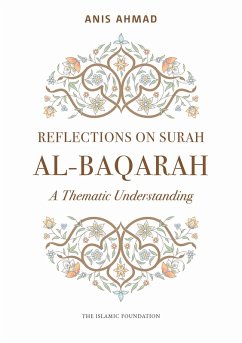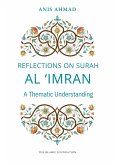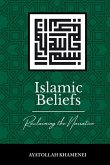- Broschiertes Buch
- Merkliste
- Auf die Merkliste
- Bewerten Bewerten
- Teilen
- Produkt teilen
- Produkterinnerung
- Produkterinnerung
Continuing with the Reflections series, this book focusses on the longest chapter in the Qur'an. Written in a simple and easy to read format, allowing the reader to absorb the key points that this chapter of the Qur'an is trying to convey.
Andere Kunden interessierten sich auch für
![Reflections on Surah Al Imran Reflections on Surah Al Imran]() Anis AhmadReflections on Surah Al Imran9,49 €
Anis AhmadReflections on Surah Al Imran9,49 €![O Humankind: Surah Ya-Sin O Humankind: Surah Ya-Sin]() Cemalnur SargutO Humankind: Surah Ya-Sin27,99 €
Cemalnur SargutO Humankind: Surah Ya-Sin27,99 €![Theodicy, Secularism, & Religious Scholarship: Al-Istinbãtu Min Al-Bahri Al A'mìq: Drops From the Deep Ocean-Reflections on the Qurãn Theodicy, Secularism, & Religious Scholarship: Al-Istinbãtu Min Al-Bahri Al A'mìq: Drops From the Deep Ocean-Reflections on the Qurãn]() M. Yunus KumekTheodicy, Secularism, & Religious Scholarship: Al-Istinbãtu Min Al-Bahri Al A'mìq: Drops From the Deep Ocean-Reflections on the Qurãn19,99 €
M. Yunus KumekTheodicy, Secularism, & Religious Scholarship: Al-Istinbãtu Min Al-Bahri Al A'mìq: Drops From the Deep Ocean-Reflections on the Qurãn19,99 €![Islamic Beliefs Islamic Beliefs]() Ayatollah Sayyid Ali KhameneiIslamic Beliefs32,99 €
Ayatollah Sayyid Ali KhameneiIslamic Beliefs32,99 €![Corrections in Early Qurʾān Manuscripts Corrections in Early Qurʾān Manuscripts]() Daniel A BrubakerCorrections in Early Qurʾān Manuscripts13,99 €
Daniel A BrubakerCorrections in Early Qurʾān Manuscripts13,99 €![Unlocking Surah al-Fatihah Unlocking Surah al-Fatihah]() Ahmad Al-Tijani Thani Al-AzhariUnlocking Surah al-Fatihah19,99 €
Ahmad Al-Tijani Thani Al-AzhariUnlocking Surah al-Fatihah19,99 €![Fadl and Rahmah of Allah in Guidance: Al-Istinbãtu Min Al-Bahri Al A'mìq: Drops From the Deep Ocean-Reflections on the Qurãn Fadl and Rahmah of Allah in Guidance: Al-Istinbãtu Min Al-Bahri Al A'mìq: Drops From the Deep Ocean-Reflections on the Qurãn]() M. Yunus KumekFadl and Rahmah of Allah in Guidance: Al-Istinbãtu Min Al-Bahri Al A'mìq: Drops From the Deep Ocean-Reflections on the Qurãn19,99 €
M. Yunus KumekFadl and Rahmah of Allah in Guidance: Al-Istinbãtu Min Al-Bahri Al A'mìq: Drops From the Deep Ocean-Reflections on the Qurãn19,99 €-
-
Continuing with the Reflections series, this book focusses on the longest chapter in the Qur'an. Written in a simple and easy to read format, allowing the reader to absorb the key points that this chapter of the Qur'an is trying to convey.
Produktdetails
- Produktdetails
- Verlag: Kube Publishing Ltd
- Seitenzahl: 241
- Erscheinungstermin: 7. Januar 2025
- Englisch
- Abmessung: 208mm x 148mm x 12mm
- Gewicht: 363g
- ISBN-13: 9780860379836
- ISBN-10: 0860379833
- Artikelnr.: 72110295
- Herstellerkennzeichnung
- Libri GmbH
- Europaallee 1
- 36244 Bad Hersfeld
- gpsr@libri.de
- Verlag: Kube Publishing Ltd
- Seitenzahl: 241
- Erscheinungstermin: 7. Januar 2025
- Englisch
- Abmessung: 208mm x 148mm x 12mm
- Gewicht: 363g
- ISBN-13: 9780860379836
- ISBN-10: 0860379833
- Artikelnr.: 72110295
- Herstellerkennzeichnung
- Libri GmbH
- Europaallee 1
- 36244 Bad Hersfeld
- gpsr@libri.de
Anis Ahmad is a Pakistani social scientist, an educationist, and a professor of Islam. He is the recipient of an award, from the Higher Education Commission of Pakistan, awarded a fellowship by the University of Science Malaysia, and also earned a meritorious professorship at the International Islamic University, Islamabad, Pakistan. As the first Vice-President of the International Islamic University, Islamabad, he visualised and founded the Da’wah Academy of the I.I.U.I. He was the first Dean of the Faculty of Usul al-din and Faculty of Social Sciences of the IIU at Islamabad. He was the first Dean of the Faculty of Islamic Revealed Knowledge and Human Sciences of the International Islamic University, Malaysia.
Preface 1
» Introduction to al-Baqarah 7
» An Overview: Five Thematic Groups of Verses 12
» The Change of Leadership 15
» Guidance on Social Ethics 17
» The Uniqueness of Qur’anic Guidance 17
» Preservation of the Qur’an 20
» The Earlier Scriptures 21
» The Most Appropriate Universal Guidance (Hidayah) 24
» The Universality of the Qur’an 27
» Taqwa is a Prerequisite of Hidayah 29
» The Ethical Empowerment of Human Beings 32
» The Role of Guidance (Hidayah) in Achieving Taqwa,
Virtue, Piety and Servitude 34
» Taqwa as a Behavioural Practice, Objective of all
Acts of Devotion and a Key Theme in the Qur’an 40
» The Real Success (Falah) 44
» The Culture of Infaq 45
» Two Types of Human Conduct and Behaviour:
Disbelief (Kufr) and Hypocrisy (Nifaq) 47
» The Meaning of Hypocrisy (Nifaq) 49
» The Inimitability of the Qur’an 53
» The Wisdom (Hikmah) in the Challenge to Produce
Something Like the Qur’an 54
» Comprehensiveness of the Din 56
Lessons from the Story of Prophet Adam 61
» Iblis’s Modern Forms of Temptations:
Cultural Colonialism and Entrepreneurial Capitalism 63
» The Fourfold Implication of Khilafah: What Khilafah is and is not 65
» The Leadership Role of Earlier Peoples: The Case of Bani Isra‘il 67
» In the Wilderness of Sinai 69
» Shirk (Associating with Allah) and Nifaq (Hypocracy),
The Two Major Transgressions that Lead to Helfire 73
» Realizing Tawhid in the Social Sphere 74
» The Transgressions of the Israelites 76
» Allah’s Mercy and the Israelites’ Response 77
» A Universal Message: Tawhid as the Common Ground 79
» The Israelites’ Practice of Double Standards 82
» The Negative Effects of the Israelites’ Cultural Assimilation in Egypt 83
» The Response of the Jewish Community in Madinah 84
» Immediacy Instead of Ultimacy 86
» The Dialogical Approach 90
» Implications of the Covenant: Serving Allah Through Salah and Zakah 94
» Serving Parents as a Demand of Tawhid 96
» The Qur’anic Model of Extended Family 98
» The Rights of the Marginalized: The Culture of Ihsan 100
» The Ethics of Communication 101
» The Culture of Using Communication in a Dignified Way 104
» The Status of Earlier Sacred Laws 105
» Religious Pluralism and the Right to Worship in an Islamic Polity 111
» Similarity of and Constancy in the Message (Da‘wah) of all the Prophets
113
» The Conferment of Leadership on Prophet Ibrahim 115
» A Dialogue Based on the Abrahamic Faith 116
» Sibghat Allah: From Physical Identity to Ideological Identity
and from Symbolic Colours and Signs of Devotion to
Substantial Transformation and Exemplary Conduct 117
» Allah’s Colour 118
» The Leadership Role of the Muslim Ummah 119
» Conferment of the Leadership Role of the Muslim Ummah 121
» The Ummah as a Model of Justice (‘Adl) and Moderation (Wasatiyyah) 123
» The Obligations of the Leadership of Mankind 127
» The Culture of Gratitude, Perseverance and Remembrance 128
» The Culture of Ethical Intelligence and Striving (Jihad) 131
» Continuity and Change in the Shari’ah 133
» The Unreasonableness of the People of the Book 136
» The Culture of Research, Reason, and Introspection 136
» Qur’anic Pointers 138
» Is Religion a Personal Matter? 140
» The Culture of Righteousness, Piety, and Allah-consciousness:
The ayat al-Birr 141
» The Sanctity of Life and Legal Equality:
The Principle of Justice (‘Adl) and Excellence (Ihsan) 145
» Implications of the Qur’anic Ordinance: The Principle of Legal Equality
148
» Social Justice 148
» The Supremacy of Law and the State 149
» Social and Legal Fairness 151
» The Dimensions of Piety 153
» Fasting and the Inculcation of Allah-Consciousness 154
» The Culture of Tazkiyah in Financial,
Trade and Economic Transactions 159
» Liberation from Superstitions 160
» War Ethics 161
» The Prohibition of Self-infliction of Harm 163
» The Globalisation of Da’wah and Islamic Brotherhood 164
» Two Types of Personality 170
» The Holistic Personality 174
» The Unity of Humankind 176
» The Culture of Benevolence (Infaq) and Social Engagement 179
» The Culture of Benevolence 182
» War Ethics 184
» The Dynamics of Faith and Migration (Hijrah) 186
» The Gradual Removal of Social Evils through Ma‘ruf 190
» The Institutionalization of Social Engagement 192
» The Building of a Compassionate Family 197
» Family Ethics 199
» A Graceful Family Life 201
» Striving to Achieve Justice and Peace 204
» The Leadership of Mankind 206
» The Role of Reason, Revelation and Miracles 210
» Encouragement of Social Engagement and the
Culture of Spending on Others (Infaq) 212
The Beauty of the Verse of the Throne (Ayat al-Kursi) 213
» Religious Freedom 215
» Rushd and Taghut 216
» Experiential Truth 219
» Manifestation of Faith in Infaq
(Spending on Others for Allah’s Sake) 223
» The Gift of Wisdom 225
» The Culture of Almsgiving (Sadaqah) 230
» The Secular Concept of Corporate Social Responsibility vs.
The Culture of Infaq and Sadaqah 233
» Establishing an Interest-free Society 233
» No Gender Disparity in Legal Matters 236
» Introduction to al-Baqarah 7
» An Overview: Five Thematic Groups of Verses 12
» The Change of Leadership 15
» Guidance on Social Ethics 17
» The Uniqueness of Qur’anic Guidance 17
» Preservation of the Qur’an 20
» The Earlier Scriptures 21
» The Most Appropriate Universal Guidance (Hidayah) 24
» The Universality of the Qur’an 27
» Taqwa is a Prerequisite of Hidayah 29
» The Ethical Empowerment of Human Beings 32
» The Role of Guidance (Hidayah) in Achieving Taqwa,
Virtue, Piety and Servitude 34
» Taqwa as a Behavioural Practice, Objective of all
Acts of Devotion and a Key Theme in the Qur’an 40
» The Real Success (Falah) 44
» The Culture of Infaq 45
» Two Types of Human Conduct and Behaviour:
Disbelief (Kufr) and Hypocrisy (Nifaq) 47
» The Meaning of Hypocrisy (Nifaq) 49
» The Inimitability of the Qur’an 53
» The Wisdom (Hikmah) in the Challenge to Produce
Something Like the Qur’an 54
» Comprehensiveness of the Din 56
Lessons from the Story of Prophet Adam 61
» Iblis’s Modern Forms of Temptations:
Cultural Colonialism and Entrepreneurial Capitalism 63
» The Fourfold Implication of Khilafah: What Khilafah is and is not 65
» The Leadership Role of Earlier Peoples: The Case of Bani Isra‘il 67
» In the Wilderness of Sinai 69
» Shirk (Associating with Allah) and Nifaq (Hypocracy),
The Two Major Transgressions that Lead to Helfire 73
» Realizing Tawhid in the Social Sphere 74
» The Transgressions of the Israelites 76
» Allah’s Mercy and the Israelites’ Response 77
» A Universal Message: Tawhid as the Common Ground 79
» The Israelites’ Practice of Double Standards 82
» The Negative Effects of the Israelites’ Cultural Assimilation in Egypt 83
» The Response of the Jewish Community in Madinah 84
» Immediacy Instead of Ultimacy 86
» The Dialogical Approach 90
» Implications of the Covenant: Serving Allah Through Salah and Zakah 94
» Serving Parents as a Demand of Tawhid 96
» The Qur’anic Model of Extended Family 98
» The Rights of the Marginalized: The Culture of Ihsan 100
» The Ethics of Communication 101
» The Culture of Using Communication in a Dignified Way 104
» The Status of Earlier Sacred Laws 105
» Religious Pluralism and the Right to Worship in an Islamic Polity 111
» Similarity of and Constancy in the Message (Da‘wah) of all the Prophets
113
» The Conferment of Leadership on Prophet Ibrahim 115
» A Dialogue Based on the Abrahamic Faith 116
» Sibghat Allah: From Physical Identity to Ideological Identity
and from Symbolic Colours and Signs of Devotion to
Substantial Transformation and Exemplary Conduct 117
» Allah’s Colour 118
» The Leadership Role of the Muslim Ummah 119
» Conferment of the Leadership Role of the Muslim Ummah 121
» The Ummah as a Model of Justice (‘Adl) and Moderation (Wasatiyyah) 123
» The Obligations of the Leadership of Mankind 127
» The Culture of Gratitude, Perseverance and Remembrance 128
» The Culture of Ethical Intelligence and Striving (Jihad) 131
» Continuity and Change in the Shari’ah 133
» The Unreasonableness of the People of the Book 136
» The Culture of Research, Reason, and Introspection 136
» Qur’anic Pointers 138
» Is Religion a Personal Matter? 140
» The Culture of Righteousness, Piety, and Allah-consciousness:
The ayat al-Birr 141
» The Sanctity of Life and Legal Equality:
The Principle of Justice (‘Adl) and Excellence (Ihsan) 145
» Implications of the Qur’anic Ordinance: The Principle of Legal Equality
148
» Social Justice 148
» The Supremacy of Law and the State 149
» Social and Legal Fairness 151
» The Dimensions of Piety 153
» Fasting and the Inculcation of Allah-Consciousness 154
» The Culture of Tazkiyah in Financial,
Trade and Economic Transactions 159
» Liberation from Superstitions 160
» War Ethics 161
» The Prohibition of Self-infliction of Harm 163
» The Globalisation of Da’wah and Islamic Brotherhood 164
» Two Types of Personality 170
» The Holistic Personality 174
» The Unity of Humankind 176
» The Culture of Benevolence (Infaq) and Social Engagement 179
» The Culture of Benevolence 182
» War Ethics 184
» The Dynamics of Faith and Migration (Hijrah) 186
» The Gradual Removal of Social Evils through Ma‘ruf 190
» The Institutionalization of Social Engagement 192
» The Building of a Compassionate Family 197
» Family Ethics 199
» A Graceful Family Life 201
» Striving to Achieve Justice and Peace 204
» The Leadership of Mankind 206
» The Role of Reason, Revelation and Miracles 210
» Encouragement of Social Engagement and the
Culture of Spending on Others (Infaq) 212
The Beauty of the Verse of the Throne (Ayat al-Kursi) 213
» Religious Freedom 215
» Rushd and Taghut 216
» Experiential Truth 219
» Manifestation of Faith in Infaq
(Spending on Others for Allah’s Sake) 223
» The Gift of Wisdom 225
» The Culture of Almsgiving (Sadaqah) 230
» The Secular Concept of Corporate Social Responsibility vs.
The Culture of Infaq and Sadaqah 233
» Establishing an Interest-free Society 233
» No Gender Disparity in Legal Matters 236
Preface 1
» Introduction to al-Baqarah 7
» An Overview: Five Thematic Groups of Verses 12
» The Change of Leadership 15
» Guidance on Social Ethics 17
» The Uniqueness of Qur’anic Guidance 17
» Preservation of the Qur’an 20
» The Earlier Scriptures 21
» The Most Appropriate Universal Guidance (Hidayah) 24
» The Universality of the Qur’an 27
» Taqwa is a Prerequisite of Hidayah 29
» The Ethical Empowerment of Human Beings 32
» The Role of Guidance (Hidayah) in Achieving Taqwa,
Virtue, Piety and Servitude 34
» Taqwa as a Behavioural Practice, Objective of all
Acts of Devotion and a Key Theme in the Qur’an 40
» The Real Success (Falah) 44
» The Culture of Infaq 45
» Two Types of Human Conduct and Behaviour:
Disbelief (Kufr) and Hypocrisy (Nifaq) 47
» The Meaning of Hypocrisy (Nifaq) 49
» The Inimitability of the Qur’an 53
» The Wisdom (Hikmah) in the Challenge to Produce
Something Like the Qur’an 54
» Comprehensiveness of the Din 56
Lessons from the Story of Prophet Adam 61
» Iblis’s Modern Forms of Temptations:
Cultural Colonialism and Entrepreneurial Capitalism 63
» The Fourfold Implication of Khilafah: What Khilafah is and is not 65
» The Leadership Role of Earlier Peoples: The Case of Bani Isra‘il 67
» In the Wilderness of Sinai 69
» Shirk (Associating with Allah) and Nifaq (Hypocracy),
The Two Major Transgressions that Lead to Helfire 73
» Realizing Tawhid in the Social Sphere 74
» The Transgressions of the Israelites 76
» Allah’s Mercy and the Israelites’ Response 77
» A Universal Message: Tawhid as the Common Ground 79
» The Israelites’ Practice of Double Standards 82
» The Negative Effects of the Israelites’ Cultural Assimilation in Egypt 83
» The Response of the Jewish Community in Madinah 84
» Immediacy Instead of Ultimacy 86
» The Dialogical Approach 90
» Implications of the Covenant: Serving Allah Through Salah and Zakah 94
» Serving Parents as a Demand of Tawhid 96
» The Qur’anic Model of Extended Family 98
» The Rights of the Marginalized: The Culture of Ihsan 100
» The Ethics of Communication 101
» The Culture of Using Communication in a Dignified Way 104
» The Status of Earlier Sacred Laws 105
» Religious Pluralism and the Right to Worship in an Islamic Polity 111
» Similarity of and Constancy in the Message (Da‘wah) of all the Prophets
113
» The Conferment of Leadership on Prophet Ibrahim 115
» A Dialogue Based on the Abrahamic Faith 116
» Sibghat Allah: From Physical Identity to Ideological Identity
and from Symbolic Colours and Signs of Devotion to
Substantial Transformation and Exemplary Conduct 117
» Allah’s Colour 118
» The Leadership Role of the Muslim Ummah 119
» Conferment of the Leadership Role of the Muslim Ummah 121
» The Ummah as a Model of Justice (‘Adl) and Moderation (Wasatiyyah) 123
» The Obligations of the Leadership of Mankind 127
» The Culture of Gratitude, Perseverance and Remembrance 128
» The Culture of Ethical Intelligence and Striving (Jihad) 131
» Continuity and Change in the Shari’ah 133
» The Unreasonableness of the People of the Book 136
» The Culture of Research, Reason, and Introspection 136
» Qur’anic Pointers 138
» Is Religion a Personal Matter? 140
» The Culture of Righteousness, Piety, and Allah-consciousness:
The ayat al-Birr 141
» The Sanctity of Life and Legal Equality:
The Principle of Justice (‘Adl) and Excellence (Ihsan) 145
» Implications of the Qur’anic Ordinance: The Principle of Legal Equality
148
» Social Justice 148
» The Supremacy of Law and the State 149
» Social and Legal Fairness 151
» The Dimensions of Piety 153
» Fasting and the Inculcation of Allah-Consciousness 154
» The Culture of Tazkiyah in Financial,
Trade and Economic Transactions 159
» Liberation from Superstitions 160
» War Ethics 161
» The Prohibition of Self-infliction of Harm 163
» The Globalisation of Da’wah and Islamic Brotherhood 164
» Two Types of Personality 170
» The Holistic Personality 174
» The Unity of Humankind 176
» The Culture of Benevolence (Infaq) and Social Engagement 179
» The Culture of Benevolence 182
» War Ethics 184
» The Dynamics of Faith and Migration (Hijrah) 186
» The Gradual Removal of Social Evils through Ma‘ruf 190
» The Institutionalization of Social Engagement 192
» The Building of a Compassionate Family 197
» Family Ethics 199
» A Graceful Family Life 201
» Striving to Achieve Justice and Peace 204
» The Leadership of Mankind 206
» The Role of Reason, Revelation and Miracles 210
» Encouragement of Social Engagement and the
Culture of Spending on Others (Infaq) 212
The Beauty of the Verse of the Throne (Ayat al-Kursi) 213
» Religious Freedom 215
» Rushd and Taghut 216
» Experiential Truth 219
» Manifestation of Faith in Infaq
(Spending on Others for Allah’s Sake) 223
» The Gift of Wisdom 225
» The Culture of Almsgiving (Sadaqah) 230
» The Secular Concept of Corporate Social Responsibility vs.
The Culture of Infaq and Sadaqah 233
» Establishing an Interest-free Society 233
» No Gender Disparity in Legal Matters 236
» Introduction to al-Baqarah 7
» An Overview: Five Thematic Groups of Verses 12
» The Change of Leadership 15
» Guidance on Social Ethics 17
» The Uniqueness of Qur’anic Guidance 17
» Preservation of the Qur’an 20
» The Earlier Scriptures 21
» The Most Appropriate Universal Guidance (Hidayah) 24
» The Universality of the Qur’an 27
» Taqwa is a Prerequisite of Hidayah 29
» The Ethical Empowerment of Human Beings 32
» The Role of Guidance (Hidayah) in Achieving Taqwa,
Virtue, Piety and Servitude 34
» Taqwa as a Behavioural Practice, Objective of all
Acts of Devotion and a Key Theme in the Qur’an 40
» The Real Success (Falah) 44
» The Culture of Infaq 45
» Two Types of Human Conduct and Behaviour:
Disbelief (Kufr) and Hypocrisy (Nifaq) 47
» The Meaning of Hypocrisy (Nifaq) 49
» The Inimitability of the Qur’an 53
» The Wisdom (Hikmah) in the Challenge to Produce
Something Like the Qur’an 54
» Comprehensiveness of the Din 56
Lessons from the Story of Prophet Adam 61
» Iblis’s Modern Forms of Temptations:
Cultural Colonialism and Entrepreneurial Capitalism 63
» The Fourfold Implication of Khilafah: What Khilafah is and is not 65
» The Leadership Role of Earlier Peoples: The Case of Bani Isra‘il 67
» In the Wilderness of Sinai 69
» Shirk (Associating with Allah) and Nifaq (Hypocracy),
The Two Major Transgressions that Lead to Helfire 73
» Realizing Tawhid in the Social Sphere 74
» The Transgressions of the Israelites 76
» Allah’s Mercy and the Israelites’ Response 77
» A Universal Message: Tawhid as the Common Ground 79
» The Israelites’ Practice of Double Standards 82
» The Negative Effects of the Israelites’ Cultural Assimilation in Egypt 83
» The Response of the Jewish Community in Madinah 84
» Immediacy Instead of Ultimacy 86
» The Dialogical Approach 90
» Implications of the Covenant: Serving Allah Through Salah and Zakah 94
» Serving Parents as a Demand of Tawhid 96
» The Qur’anic Model of Extended Family 98
» The Rights of the Marginalized: The Culture of Ihsan 100
» The Ethics of Communication 101
» The Culture of Using Communication in a Dignified Way 104
» The Status of Earlier Sacred Laws 105
» Religious Pluralism and the Right to Worship in an Islamic Polity 111
» Similarity of and Constancy in the Message (Da‘wah) of all the Prophets
113
» The Conferment of Leadership on Prophet Ibrahim 115
» A Dialogue Based on the Abrahamic Faith 116
» Sibghat Allah: From Physical Identity to Ideological Identity
and from Symbolic Colours and Signs of Devotion to
Substantial Transformation and Exemplary Conduct 117
» Allah’s Colour 118
» The Leadership Role of the Muslim Ummah 119
» Conferment of the Leadership Role of the Muslim Ummah 121
» The Ummah as a Model of Justice (‘Adl) and Moderation (Wasatiyyah) 123
» The Obligations of the Leadership of Mankind 127
» The Culture of Gratitude, Perseverance and Remembrance 128
» The Culture of Ethical Intelligence and Striving (Jihad) 131
» Continuity and Change in the Shari’ah 133
» The Unreasonableness of the People of the Book 136
» The Culture of Research, Reason, and Introspection 136
» Qur’anic Pointers 138
» Is Religion a Personal Matter? 140
» The Culture of Righteousness, Piety, and Allah-consciousness:
The ayat al-Birr 141
» The Sanctity of Life and Legal Equality:
The Principle of Justice (‘Adl) and Excellence (Ihsan) 145
» Implications of the Qur’anic Ordinance: The Principle of Legal Equality
148
» Social Justice 148
» The Supremacy of Law and the State 149
» Social and Legal Fairness 151
» The Dimensions of Piety 153
» Fasting and the Inculcation of Allah-Consciousness 154
» The Culture of Tazkiyah in Financial,
Trade and Economic Transactions 159
» Liberation from Superstitions 160
» War Ethics 161
» The Prohibition of Self-infliction of Harm 163
» The Globalisation of Da’wah and Islamic Brotherhood 164
» Two Types of Personality 170
» The Holistic Personality 174
» The Unity of Humankind 176
» The Culture of Benevolence (Infaq) and Social Engagement 179
» The Culture of Benevolence 182
» War Ethics 184
» The Dynamics of Faith and Migration (Hijrah) 186
» The Gradual Removal of Social Evils through Ma‘ruf 190
» The Institutionalization of Social Engagement 192
» The Building of a Compassionate Family 197
» Family Ethics 199
» A Graceful Family Life 201
» Striving to Achieve Justice and Peace 204
» The Leadership of Mankind 206
» The Role of Reason, Revelation and Miracles 210
» Encouragement of Social Engagement and the
Culture of Spending on Others (Infaq) 212
The Beauty of the Verse of the Throne (Ayat al-Kursi) 213
» Religious Freedom 215
» Rushd and Taghut 216
» Experiential Truth 219
» Manifestation of Faith in Infaq
(Spending on Others for Allah’s Sake) 223
» The Gift of Wisdom 225
» The Culture of Almsgiving (Sadaqah) 230
» The Secular Concept of Corporate Social Responsibility vs.
The Culture of Infaq and Sadaqah 233
» Establishing an Interest-free Society 233
» No Gender Disparity in Legal Matters 236








